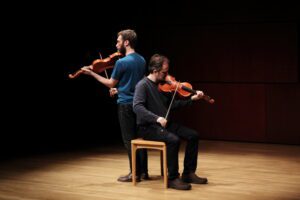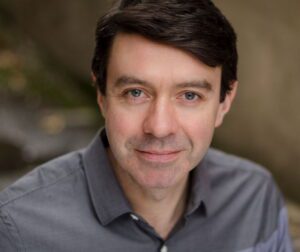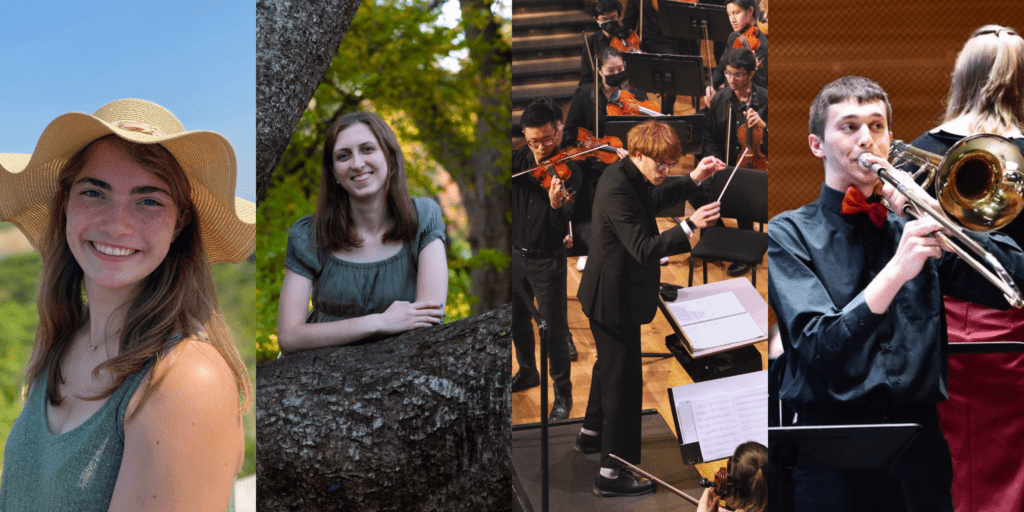
–—
Twice a week in the Lee Music Performance & Rehearsal Room, the Princeton University Sinfonia gathers to rehearse. Led by director Ruth Ochs, the orchestra is made up of students from all class years, many STEM majors coming from across the University’s myriad of technical disciplines, to enjoy a few hours a week of music and community.
The synergy between STEM and music is remarkable. Albert Einstein—a physicist, and violinist—was known “to take refuge in music” whenever he was struggling with his work. “[T]hat would usually resolve all his difficulties,” his son Hans Albert said. Indeed, music can be a respite from the demands of unrelenting problem sets and rigorous classes, but it simultaneously scratches a certain itch for STEM-minded students through notions of form and theoretical considerations around acoustics.
Ruth sees Sinfonia as a space for experimentation — a kind of musical “lab” in which she “get[s] to catch the dreams of the students.” For budding composers, this may mean the rare opportunity to hear their own work performed by an orchestra; for promising soloists, the thrill of whizzing through a concerto solo buoyed by the impressive sound of the ensemble. Paramount to Sinfonia’s raison-d’etre is providing student musicians with a welcoming space in which they may pause the daily grind of classes, essays, and, for many, problem sets to settle in with the practice of music-making.
We sat down with four of the STEM majors that make up Sinfonia. Read on to get to know Katya, Katie, Eddie, and Jack.
–—
Katya Williams ’23
Oboe, English Horn & DNA
“Ever since I first learned about DNA in eighth grade, I was fascinated that the instructions for building every living thing could be encoded in four molecules repeating billions of times.”
Growing up just outside of Scranton, Pennsylvania, in a small town called Clarks Summit, Katya was awestruck by the marvels of nature that surrounded her — hillsides would burst into rich autumnal hues every year; night skies would twinkle with infinite stars. “Growing up surrounded by all this nature gave me a special appreciation for life in all its forms, which led me to my interest in biology.” That, and growing up in a women-in-STEM-oriented family; her mom, a math and engineering teacher at Katya’s old high school, has a Ph.D. in structural engineering.
Now a senior in the Department of Molecular Biology with a certificate in Quantitative and Computational Biology, Katya has spent much of her final year at Princeton in the Adamson Lab; she’s working with prime editing, a CRISPR-Cas9-based gene editing tool that can make preprogrammed edits targeted anywhere in the genome of a living cell.
A member of Sinfonia for all four years of her Princeton career, Katya calls the ensemble her “solace” — alongside TapCats, Princeton’s student-led tap dancing group, of which Katya has been artistic director these past three years. Especially in the busy final two years at Princeton, as the intensity builds toward thesis submission and graduation, devoting time and focus to such favorite works as Saint-Saëns’s Danse Macabre (from Sinfonia’s Fall 2021 Halloween concert) and Rossini’s William Tell Overture (from Sinfonia’s Fall 2022 concert) has been a joyful experience. So too has been the experience of performing new works by fellow students, like Benjamin Edelson’s music with its “rich harmonies and wonderful color,” and overlooked works, including twentieth-century composer Joaquín Turina’s Danzas Fantasticas and works by marginalized female composers.
“As an oboe and English horn player, I always enjoy music that features my instruments. [But] some of my favorite pieces [we’ve played in Sinfonia] have been student-written.”
Beyond musical practice, Katya has also enjoyed learning the history and theory behind some of her favorite pieces. She’s taken the Department of Music’s two introductory theory courses, MUS 105 and 106, along with two courses on music history, including a survey of the history of the concerto with Ruth.
“I loved studying the history of the concerto genre under Ruth Ochs […] She’s an amazing lecturer who conveys her passion for music in every class.”
Music for Katya and her fellow STEM-major friends has been a way of relaxing — of “releasing my emotions and wind[ing] down after a long day” — but she recognizes that there are certain consistencies between the two disciplines that have always attracted her, like their methodical nature, “both in a hands-on, technical way and in an overall sense of form.” She likens the skill-building of learning an instrument and developing refined muscle memory to the physical task of performing lab work, “whether [in] using the machines or learning how best to pipette liquids.” There is also a similarity between working one’s way through and thinking through highly-structured musical forms and “puzzling out” how particular biological, chemical, or physical systems work.
“While music and science seem to share a practice-makes-perfect approach and engage the logical part of my brain to predict what comes next, music helps me release my emotions and wind down after a long day.”
With graduation on the horizon, Katya is excited for the next chapter of her life: she has just finished applying to graduate programs in genetics and hopes to become a professor one day. But the value of regular musical practice will likely stay with her.
“School takes up a lot of time, and it might seem like throwing the ‘less important’ activities aside in order to get everything done will buy you the time you need. However, playing music with Sinfonia has been my solace every year.”
–—
Katie Baldwin ’24
Cello & Software Engineering
“I distinctly remember hearing the orchestra tuning at our first rehearsal — a sound that I hadn’t realized how much I had missed.”
Sinfonia rehearsals today look rather different than when now-junior Katie Baldwin first joined the ensemble in the fall of 2020. “Everyone was at home, which made orchestral playing all but impossible.” Disheartened yet undeterred, the ensemble continued meeting in the virtual space, listening to music together and, from time to time, bringing out their instruments to play, albeit muted, as Ruth would conduct along to a recording. During Katie’s sophomore fall “real Sinfonia” began.
Katie has been playing the cello since age six, when her parents — mom, a musician who’d played various instruments throughout her life, and dad, an avid listener of music from all genres — encouraged her to choose a string instrument to learn. In fourth grade, she joined her first youth orchestra; in tenth grade, she left to join the Philadelphia Young Artists Orchestra; and in twelfth grade, she joined the prestigious Philadelphia Youth Orchestra.
Coming to Princeton, Katie continued pursuing music as a passion, joining both Sinfonia and all-cello ensemble La Vie en Cello (of which today she is group secretary and sometimes-arranger). Among her favorite experiences has been performing the William Tell Overture (particularly the cello chorale) this past fall with Sinfonia. She has also taken several classes in the Department of Music to broaden her knowledge of the works that she loves: in Fall 2022, she enrolled in MUS 105 (Music Theory through Performance and Composition) and STC 204/MUS 204 (Musical Instruments, Sound, Perception, and Creativity); Spring 2023 brings the long-awaited opportunity to learn conducting in MPP 216 (Techniques of Conducting).
The bulk of Katie’s time, of course, is devoted to her major: Computer Science (AB). Like music, computer science has been a sort of family affair. Both of her parents majored in it in college, and her dad still works in the field today. After Princeton, Katie plans to pursue a career in software engineering. But she has found joy in piecing her STEM and music interests together these past three years, both on and off campus.
“I’ve intentionally built music into my schedule through participating in ensembles because there’s more accountability than if I were just trying to practice on my own. I often need that break from academic work.”
Last summer, while interning at the Helmholtz Environmental Research Centre in Leipzig, she found ample opportunities to enjoy the musical culture of the city. She spent her days supporting a hydrology research group by adding features to their website to display the data of their hydrological model to the general public and her nights and weekends attending concerts at the Thomaskirche, which was J.S. Bach’s church, visiting the Bach museum across the street, and attending the Gewandhausorchester’s end-of-year concert — which boasted over 30,000 people in attendance!
For Katie — as for so many STEM-minded musicians — the two fields are closely related: “Music is very systematic, even formulaic sometimes […] which I think tends to be very satisfying to a STEM-minded person.” There’s also the physical side of music — frequencies, sound waves, harmonics, overtones — that she’s been exploring in her instrument-building course (which, tellingly, counts as a science lab).
“Perhaps music is a field that tends to appeal to STEM people partially because of its STEM-like undercurrents, but also because making music is different enough from academic STEM work that participating in it really does feel like a break.”
–—
Eddie Zhang ’24
Violin, Piano & Environmental Engineering
“I really didn’t expect to get into the music community at Princeton. But then my first year attending school was virtual, so I was at home, and I wanted to feel a sense of community. The music groups really seemed to provide that.”
Eddie Zhang grew up on the competition circuit, so when he made the choice in grades eleven and twelve to distance himself from music and focus instead on his studies and other, non-musical extracurriculars, it was a big change. He’d been playing violin and piano ever since he was six, but they had begun to feel unfulfilling: “I wasn’t really playing for enjoyment.” What he did feel a passion for was sustainability. With an extracurricular life centered on volunteering for environmental organizations and implementing sustainability projects as president of his school’s environmental organization, Eddie was eager to pursue formal studies in environmental engineering at college.
But the first semester at Princeton wasn’t what Eddie, or any other student, expected it to be. It was the fall of 2020, and Eddie was attending classes virtually from his family home in Canada. “I wanted to feel a sense of community.” He attended Zoom sessions with the Princeton Pianists Ensemble and quickly fell in with the group. “We did these great icebreaker activities that helped us get to know everybody in the club. We used Discord for sectional rehearsals, and we even had a virtual concert with many, many pieces. COVID did not put a stop to PPE.”
Returning to Princeton his sophomore year, eager to find another extracurricular outlet where music wasn’t competitive, but community-building, Eddie decided to join Sinfonia. “A lot of my joy in music, I’ve realized, comes with playing in an ensemble.” Sinfonia offered a whole new bounty of learnings and experiences: the chance to accompany piano faculty member Francine Kay on Schumann’s Introduction and Concert Allegro, Op. 134 in concert in the expansive LCA Forum (which is also Eddie’s favorite place to study), with an audience surrounding the orchestra; the opportunity to explore and share musical riches from underrepresented composer groups.
“Here at Princeton, there are things I’ve done that I will never have an opportunity to do ever again, whether that’s playing a solo concerto with Sinfonia last semester or playing onstage with five other pianists at once. The flexibility and support that you get at Princeton and through the Music Department is just unparalleled.”
Of course, Eddie spends the majority of his time on his STEM studies. He’s interested in water resources engineering and wants to combine his awareness of the social and community issues within the water industry with his technical understanding to pinpoint quantitatively how he and others can work to make improvements. In his career, this may manifest as research into water treatment systems, research into flood management and building resiliency for communities to protect them against climate change risks, or perhaps research into the effects of emerging contaminants, like PFAS and PFOS, on natural systems.
Eddie is perhaps more surprised than anyone by the turn of events that brought music back into his life, but he is nevertheless happy with the new role that music has taken on for him: “I see a lot of similarities between the two fields, like how STEM and music both require creativity, but I also enjoy the side of music that’s different from STEM, like not having a clear-cut answer of what’s right or wrong and having freedom in expression.” He doesn’t ascribe to the belief that extracurriculars need to fully support one’s academic work: “That’s a worthwhile endeavor, but I think what’s so great about pursuing music is that it’s an escape from your busy life where you can focus on being present and enjoying music for what it is.”
“With violin and piano, I know now that I’m doing it for myself, because I like to play music.”
–—
Jack Isaac ’23
Trombone & Math
“Outside of Princeton, I’ve never played in an orchestra. So everything is new. I’ve never played anything twice.”
Senior Jack Isaac is among Sinfonia’s musically busiest members, a member of a remarkable seven ensembles — Sinfonia, Creative Large Ensemble, Jazz Vocal Collective, Camerata, Princeton University Orchestra, the Afrobeats ensemble, and Opus. (Basically, if trombones are playing in an ensemble, “unless it’s a small jazz group,” Jack is one of them.)
Jack joined Sinfonia during his freshman year when Ruth asked him if he would sit in with the trombone section. He did, and he also played a couple of concerts. Then, COVID hit and, with Sinfonia going all virtual, his participation waned. Now, he smiles, “they can’t get rid of me.”
Coming to Princeton from a small town called Hillsville, Pennsylvania, an hour’s drive north of Pittsburgh, Jack had never before played in an orchestra. The youngest of three, born to parents who were park rangers at the State Park, Jack was homeschooled for much of his life. He began playing the trombone in fourth grade and joined the town’s school band, but performing a monumental work like Rossini’s William Tell Overture was never in the cards until Princeton.
“I’m definitely very biased towards rep like William Tell that has a lot of good trombone parts.”
All told, Jack attends about eighteen hours of rehearsal time a week, plus he has private classical trombone lessons with trombone faculty member Matt Melore. He’s also a music certificate student, so he takes Department of Music classes, including the introductory theory courses MUS 105 and 106, STC 204/MUS 204, and a couple of appreciation classes including Ruth’s symphonies class. Not to mention, of course, that he has coursework (and a thesis) for his Math major, too: he’s interested in combinatorics (“like combinations and permutations extended to a higher level”), topology (“an extension, or generalization, of open and closed brackets”), and a crossroads between the two, knot theory. Oh, he also plays on the eSports team.
“It’s not really that hard to do everything. I was thinking about taking a math class once and I was worried that I wouldn’t have enough time because it was a lot of work. I told the professor and she said, ‘Everyone has time for anything. It’s just a little bit more work.’ That stuck with me. I did end up dropping the class, but only because it was too hard. I crunched the numbers to see how much free time I should be having every day and it’s actually kind of shocking; I theoretically have a lot of free time.”
Similar to Katie, Katya, and Eddie, Jack too finds music and STEM to be sort of kindred spirits. “It feels kind of the same to do both for me; there are things from math that carry over into music and vice versa.” Things like fundamental frequencies — “you have to buzz your lips into brass instruments to make sound, and you can change your vowel combinations or your slide length to alter the fundamental or buzz your lips to choose any overtone of the fundamental” — and tuning — “You can show a lot of music with just simple fractions.”
Jack isn’t certain what will come next after Princeton. Many of his fellow math major friends are on the fence about whether they should go to grad school for math or for music. It’s a topic of conversation they discuss from time to time. What he does know is that he’s excited to continue doing what he does now. “I’m excited to keep playing in all the different ensembles and also to continue learning more about jazz through the Jazz Vocal Collective — that’s been really rewarding.”
He’s also preparing his final recital in fulfillment of the music certificate requirement. He’s smitten with an alto trombone concerto by Leopold Mozart. “I’d never heard of a classical trombone concerto. I listened to it, fell in love with it, and then I bought my own student-model alto trombone so that I can perform it in my recital. I’m really excited.”
In Other News
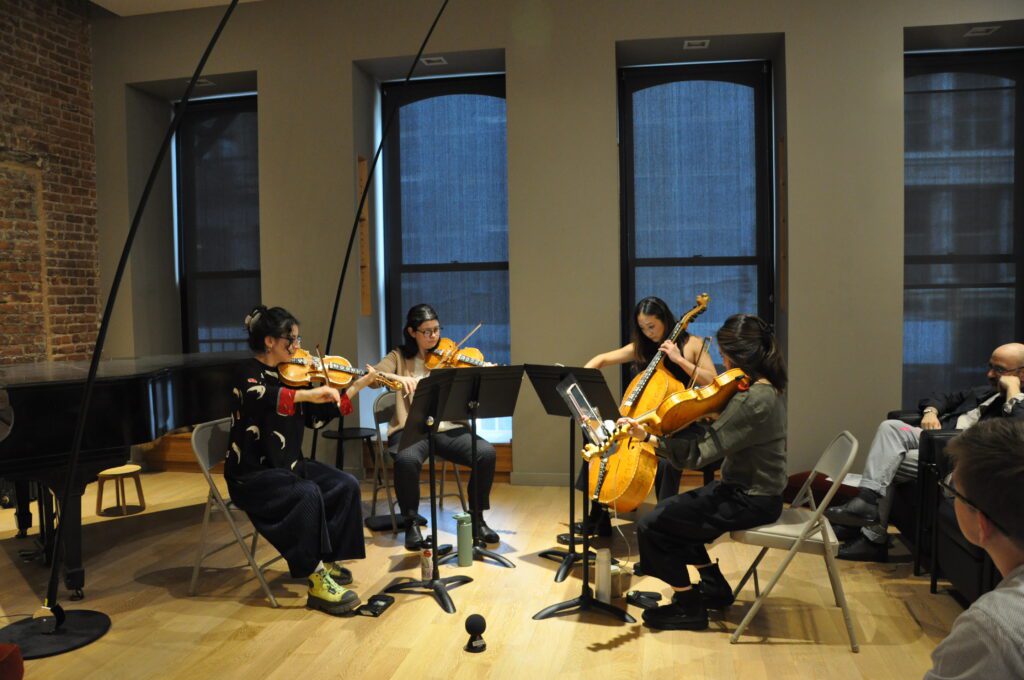
Resonant Revival: How a Norwegian Folk Fiddle Found a New Voice at Princeton
May 19, 2025
Dan Trueman, Chair of the Music Department, introduces Norwegian folk instruments to a new generation of composers and performers.
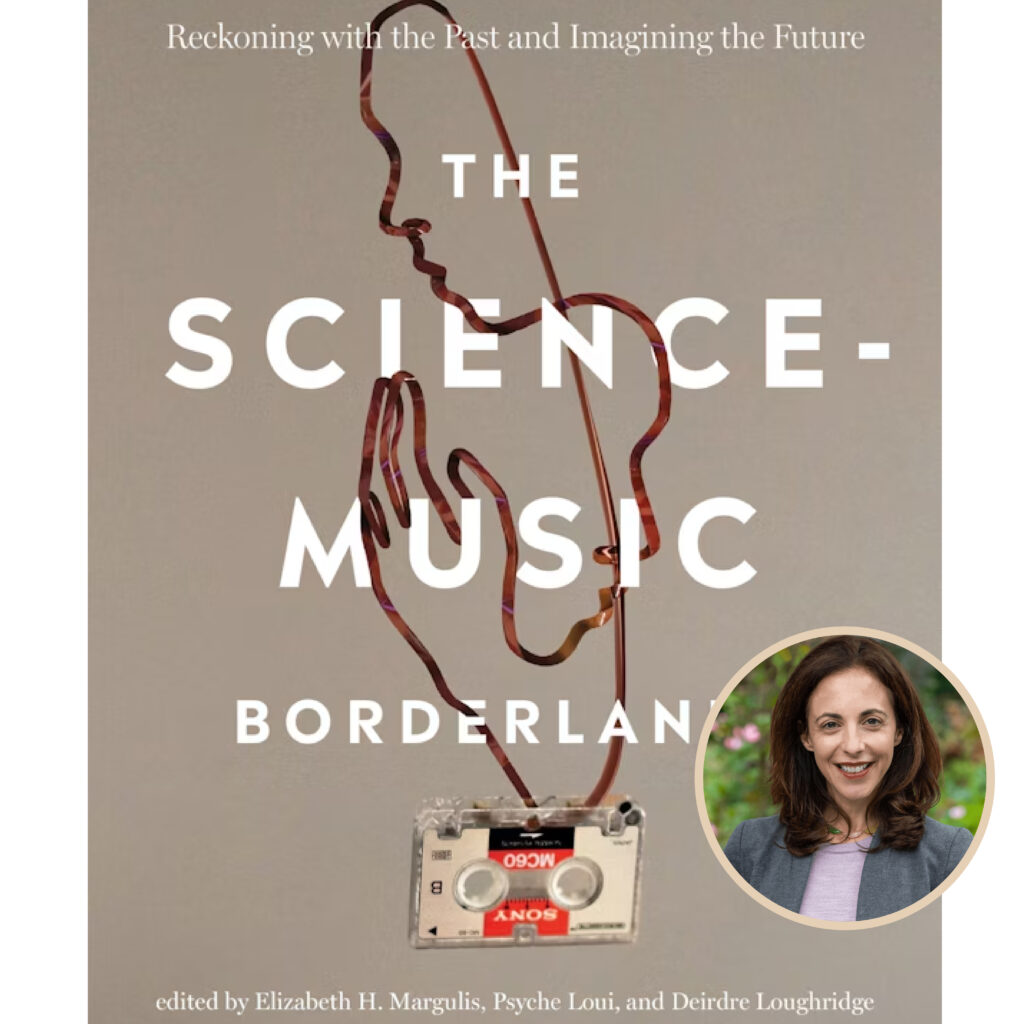
Elizabeth Margulis on the Frontiers of Music Cognition
Jan 22, 2025
The Department of Music is thrilled to congratulate musicology professor and Director of Graduate Studies Elizabeth Margulis, who has received the Ruth A. Solie Award for her editorial contributions to The Science-Music Borderlands: Reckoning with the Past and Imagining the Future.
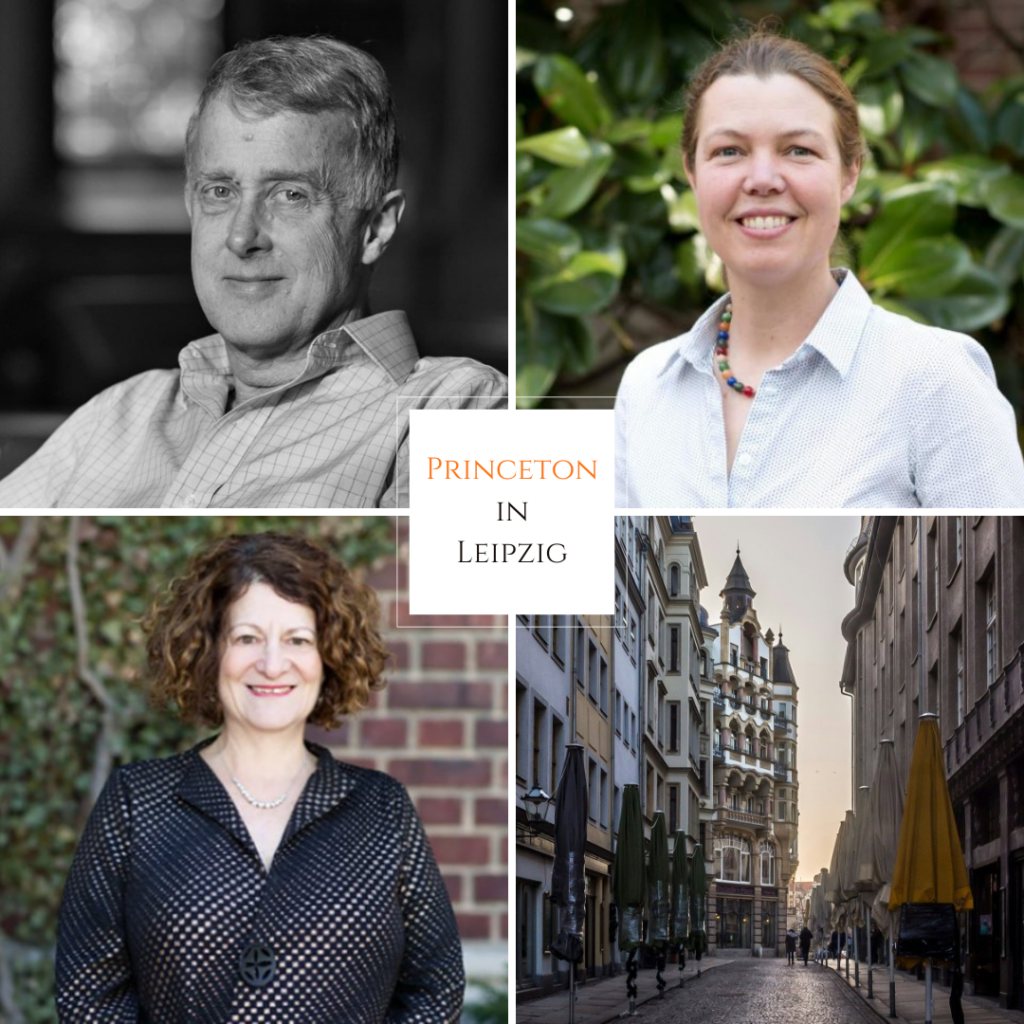
Announcing the Launch of Princeton in Leipzig
Jan 7, 2025
Enrollment in “Princeton in Leipzig” has been extended to March 2, 2025! The Princeton Music Department is excited to announce the launch of Princeton in Leipzig, a summer study abroad …


